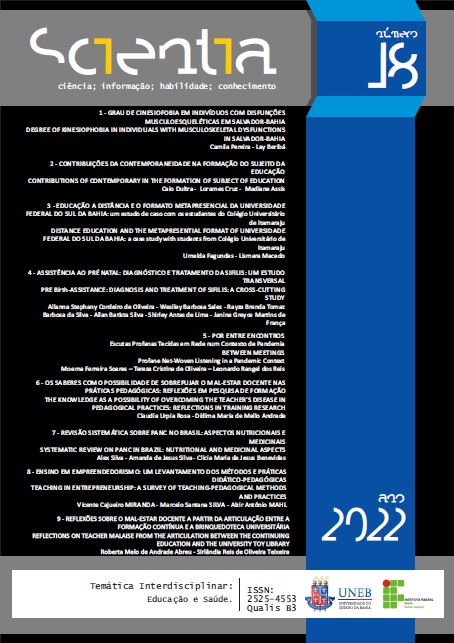THROUGH ENCOUNTERS
Profane listening intertwined by primary school teachers in Salvador/Ba in a pandemic context
Abstract
The field of teacher’s continuing education was the main interest of the extension, research and training project which originated this article. It is well known that the teacher in their continuing education is incessantly looking for ways to reinvent itself, create, and give new meaning to their practices based on demands socially constituted and desires that moves them. However, there are numerous training proposals that do not give the necessary emphasis to the working conditions faced by teachers and neglect the complex formative character of the contemporary teaching practices. Therefore, it is worth reflecting on the real possibilities of being and forming teachers in the current context. It was from this issue that we defined our extension object, research and training, contributions of profane listening in the resignification of teacher malaise, and we defined that we were going to invite elementary education teachers from the city of Salvador-Ba to be research subjects.
The initial problem can be stated this way: How profane listening, in teachers education, can contribute to resignifications of teacher malaise? The general objective was to identify and understand the contributions of profane listening to subjective elaborations of the practice and resignification of teacher malaise. The methodology was designed from the qualitative approach and the adoption of ethno-research-training and collaborative research as investigation methods. The detailing of the technical dimension that guided the operation of the research project was a collective and collaborative construction carried out with the teachers involved. It was used as data construction mechanisms the reflective diary; the conversation circle and the playful studio, for opening spaces for the use of artistic languages that sensitize the participants to share experiences and listening.
We carried out a research involved with our own teaching practice, investigating our fears and impasses, the impasses of school and the education field, identifying malaises, building training and research tools, and (trans)forming us collectively. We surpass the participation of elementary education teachers as mere objects of study and/or content recipients. The proposed extension research-training was built by the mobilization of each one of the participants, who produced, authorized themselves, starred in the experiences shared between us, and constituted a formative research community mediated by networked digital technologies.
Keywords: teacher education; teacher malaise; listening; profanation.
Downloads
Downloads
Published
How to Cite
Issue
Section
License
A partir da submissão entende-se como automática a cessão dos direitos autorais para a Revista, uma vez tendo sido aprovado e aceito para publicação.
From the submission is understood as automatic the assignment of copyrights to the Journal, once it has been approved and accepted for publication.





